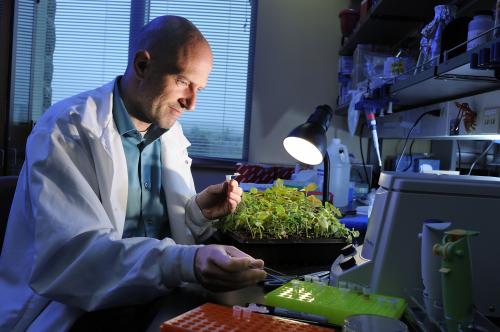A Virginia Tech researcher has developed a new way to classify and name organisms based on their genome sequence and in doing so created a universal language that scientists can use to communicate with unprecedented specificity about all life on Earth.
In a paper published in the journal PLoS ONE, Boris Vinatzer proposes moving beyond the current biological naming system to one based on the genetic sequence of each individual organism. This creates a more robust, precise, and informative name for any organism, be it a bacterium, fungus, plant, or animal.
Vinatzer, an associate professor in the College of Agriculture and Life Science's Department of Plant Pathology, Physiology, and Weed Science, suggests a new model of classification that not only crystalizes the way we identify organisms but also enhances and adds depth to the naming convention developed by the godfather of genus, Carl Linnaeus. Scientists worldwide have used the system that Linnaeus created for more than 200 years.
"Genome sequencing technology has progressed immensely in recent years and it now allows us to distinguish between any bacteria, plant, or animal at a very low cost," said Vinatzer, who is also with the Fralin Life Science Institute. "The limitation of the Linnaeus system is the absence of a method to name the sequenced organisms with precision."
Vinatzer does not propose changing the naming convention of existing biological classification. Instead, the new naming system is meant to add further information to classify organisms within named species and to more rapidly identify new ones since the process depends solely on the organism's genetic code.
A genome-based naming system could be particularly helpful to public health officials who live in an age of constant vigilance against biological threats. In his paper, Vinatzer used the anthrax strain that appeared in the wake of the Sept. 11 terrorist attacks as an example of the limitations of the current taxonomy-based system.
Weaponized anthrax frustrated officials as the powder found its way to offices in the United States and the ensuing investigation took months for law enforcement to identify the origin of the original pathogen as the Ames strain.
More than 1,200 strains of anthrax—or Bacillus anthracis—exist. Each one possesses an arbitrary name chosen by researchers that does nothing to illuminate genetic similarities.
With the naming scheme developed by Vinatzer, the name of every single anthrax strain would contain the information of how similar it is to other strains. Using Vinatzer's genome sequence, the Ames strain used in the bioterrorist attack would, for example, be known as lvlw0x and the ancestor of this strain stored at the U.S. Army Medical Research Institute for Infectious Diseases would be known as lvlwlx.
Vinatzer's naming convention would also give researchers the ability to name new pathogens in a matter of days—not months or years—based on their similarities to known pathogens.
The proposed naming process begins by sampling and sequencing an organism's DNA. The sequence is then used to generate a code unique to that individual organism based on its similarity to all previously sequenced organisms.
The advantages to Vinatzer's method over the Linnaeus system are many.
Coded names could be permanent, as opposed to the shifting of names typical in the current biological classification system. Codes could also be assigned without the current lengthy process that is required by analyzing one organism's physical traits compared to another's. Lastly, the sequence could be assigned to viruses, bacteria, fungi, plants, and animals and would provide a standardized naming system for all life on Earth.
Vinatzer cites one plant pathogen—Ralstonia solanacearum—as an example of the roller coaster of rotating name changes that exists in the world of plant pathogens. The pathogen went through three costume changes of names and was originally called Bacillus solanacearum, which then became Pseudomonas solanacearum, and then Burkholderia solanacearum before finally resting on Ralstonia.
Vinatzer has previously used genome sequencing with great success. In 2009, he and a collaborator were able to trace a pathogen that was devastating kiwifruit crops around the world back to China.
Virginia Tech is submitting a patent describing the naming scheme. Vinatzer and his collaborator Lenwood Heath, a professor in the Department of Computer Science in the College of Engineering founded This Genomic Life Inc., which will license the invention to develop it further.
Heath oversaw the development of the bioinformatic pipeline to implement the system. He was interested in collaborating with Vinatzer because of the potential to empower scientists to communicate accurately with one another about biological systems.
"I work in computation, so having the opportunity to impart my knowledge by ordering the organic world through numbered sequences of DNA was fascinating," Heath said. "The mathematical world and the living world are a lot more closely related than we think."
![]() Explore further:
Reinventing the high court of organism names
Explore further:
Reinventing the high court of organism names

